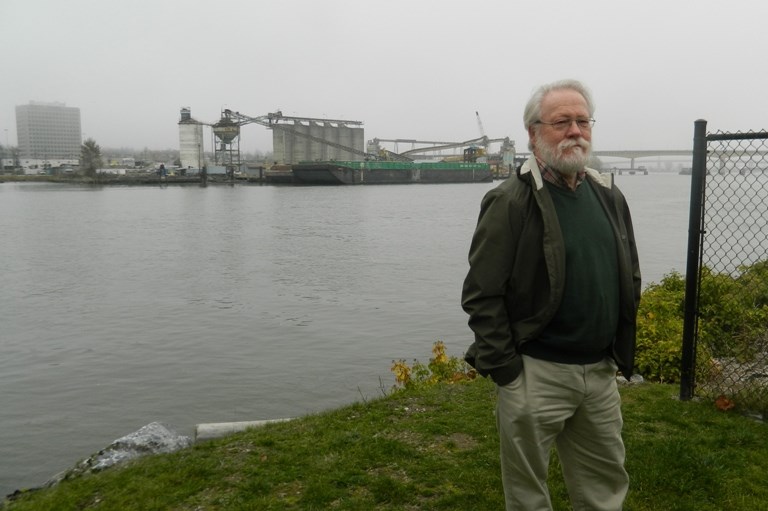Local environmental activist Otto Langer is hoping a new federal government puts the brakes on a series of proposed fossil-fuel driven industrial projects along the Fraser River that he believes will be the “death knell” for the surrounding estuary.
At the very least, Langer is asking the Liberal Party of Canada to reverse a recent series of funding cuts and amendments to federal environmental laws that he believes have allowed for such projects to proceed without an ecological or economic plan for the river, or adequate public input.
“The overall cumulative impacts of these new projects and greatly increased marine traffic has not been adequately assessed,” said Langer, a retired fisheries biologist and aquatic ecologist who helped found VAPOR, a group of residents opposed to a planned jet fuel terminal on the river, near the Riverport Entertainment Complex.
Langer contends the jet fuel project, as well as proposals to build a coal facility and LNG terminal on the south arm of the river in Surrey and Delta respectively, have occurred without proper public input or environmental oversight.
In addition, there are plans to expand the container terminal on Roberts Bank and add another LNG terminal adjacent to it.
Meanwhile, Langer (an outspoken critic of Conservative MP Alice Wong) notes a proposed 10-lane bridge replacing the Massey Tunnel will mean much larger tankers will be able to ply the river and thus degrade the ecosystem that supports the largest salmon run in the world.
Langer estimates 4,000 additional barge and/or tanker trips annually to and from the river’s estuary would occur if everything industry is proposing gets approved. According to the proposals, roughly 460 tanker trips per year would run up and down the river alone.
At issue, in particular, for Langer is how much power Port Metro Vancouver has been granted to approve projects combined with little to no input from federal scientists from Environment Canada and the Department of Fisheries and Oceans.
Last week, Langer penned an open letter to the Trudeau government, asking it to reverse the decisions made under former Prime Minister Stephen Harper.
“I urgently ask you to now look into the weaknesses in environmental review and protection legislation and process and correct those shortcomings,” said Langer.
A key point that requires addressing, according to Langer, is the reinstatement of strong environmental protection laws, which were otherwise “watered down” by the Conservatives since 2006.
“The river and estuary and its rich legacy of aquatic life forms a unique ecosystem that is now under great threat due to years of mismanagement and federal downgrading of effective environmental assessments and the handicapping of legislation. Habitat protection staff has been cut and those remaining are now unable to do the job Canadians expect of them,” said Langer.
The former Department of Fisheries and Oceans scientist said he sees glimpses of hope with the new government, as it recently announced the Canadian Coast Guard station in Kitsilano would be re-opened.
Another favourable move for Langer, since the election, has been the fact scientists are now allowed to speak publicly about their research.
Meanwhile, Liberal MP Joe Peschisolido appears to have hit the ground running, having consulted with Langer, local environmental groups and the public concerning the proposed projects.
Five Point Action Plan:
1. Restore habitat protection provisions in the Fisheries Act.
2. Upgrade habitat enforcement capabilities for DFO staff.
3. Restore the Canadian Environmental Assessment Act to facilitate more scientific review and public input.
4. Remove PMV from any authority to conduct environmental reviews
5. Develop a national energy policy focused on fossil fuel divestment.



